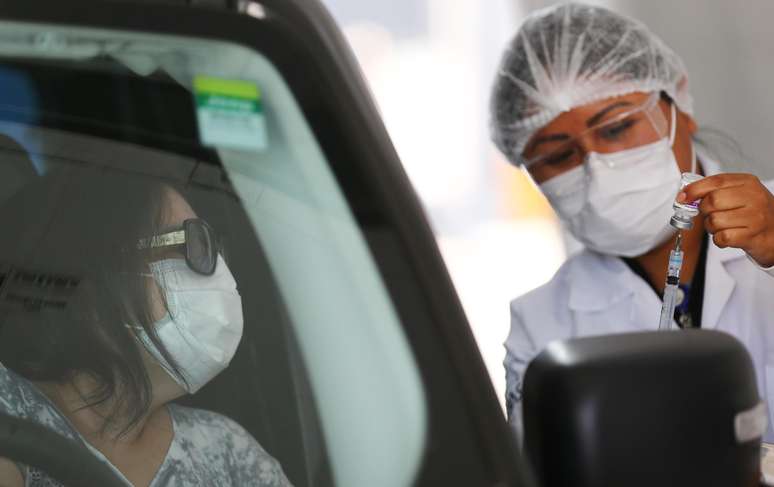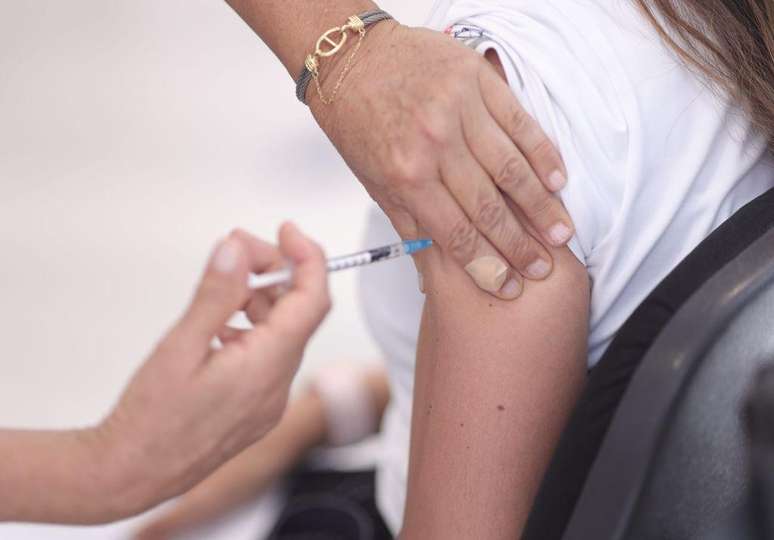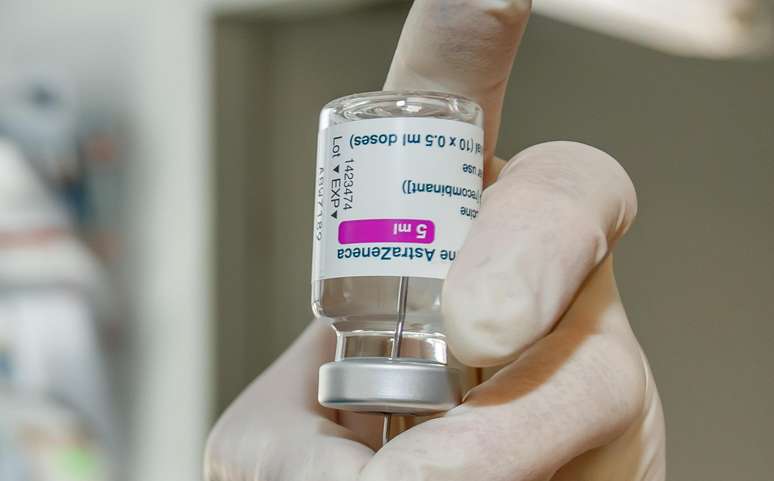The discontinuation of the use and production of the immunizer was carried out due to a possible increased risk of thrombosis days after vaccination
html[data-range=”xlarge”] figure image img.img-6e0e3708e35a271d88ca653279304f56kofgn2go { width: 774px; height: 481px; }HTML[data-range=”large”] figure image img.img-6e0e3708e35a271d88ca653279304f56kofgn2go { width: 548px; height: 340px; }HTML[data-range=”small”] figure image img.img-6e0e3708e35a271d88ca653279304f56kofgn2go, html[data-range=”medium”] figure image img.img-6e0e3708e35a271d88ca653279304f56kofgn2go { width: 564px; height: 350px; }
The Ministry of Health no longer recommends the use of viral vector vaccines (AstraZeneca and Janssen) as a booster against covid-19.
Viral vector vaccines are created from a type of adenovirus that does not harm human health.
Scientists insert some Sars-CoV-2 genes inside it, causing the immunity of those who received the dose to be trained against the cause of the covid-19 without receiving the damage of the infection.
Anyone who has taken any of the vaccines, however, whether as a first dose or a booster, shouldn’t worry.
The Ministry of Health’s halt in the use and production of immunizers has nothing to do with efficacy, but with a possible increased risk of thrombosis days after vaccination, according to a document published by the Ministry of Health .
The Ministry of Health informs that, until 17 September 2022, 98 cases have been notified in the e-SUS (0.02 cases per 100,000 doses applied) – excluding the data from São Paulo, which have not been disclosed in the document – suspected thrombotic syndrome with thrombocytopenia (decrease in platelets) temporally related to vaccines.
Of these cases, 34 were attributed to viral vector vaccines, 17 cases were recorded as having a probable relationship, and 47 occurrences were considered possible cases, according to the agency.
The conditions, which were more common in women, occurred within up to 30 days after application. Those who have received the dose the longest and have not developed thrombosis are not considered to be at risk related to the vaccine.
BBC News Brasil has applied for a position from pharmaceutical companies AstraZeneca and Janssen, who have reported receipt of the request, but have not sent a response until the time of this publication.
Why can vaccines with viral vectors cause thrombosis?
“There is the possibility that some people – and we have no way of identifying it individually – have a very personal genetic characteristic, which in contact with these viral vector vaccines, favors hypercoagulability, favoring the creation of thrombi”, explains the infection specialist Evaldo Stanislau de Araújo, of the Hospital das Clínicas of São Paulo.
According to the document from the Ministry of Health, “due to the rarity of the events, it has not yet been possible to identify the risk factors associated with the syndrome, with the exception of an apparent increased risk in subjects under the age of 40”. .
In the assessment of the immunologist Gustavo Cabral, it is not possible to say with certainty, precisely due to the lack of clarity in the association, that vaccines are responsible for cases of thrombosis.
“The scientific studies I’ve read are very good, but many explanations are missing on how the vaccine will be the trigger,” underlines him, who is a researcher at the University of São Paulo and FAPESP (Fundação de Amparo à Indagine do Estado de São Paul).
Despite the lack of detailed explanations, Cabral understands that the Ministry of Health’s decision is reasonable in the current epidemiological moment, in which viral vector vaccines are not as indispensable as they were at the height of the pandemic.

The viral vector vaccine has played its role at a critical time
Among the possible consequences of a covid-19 infection is precisely the creation of thrombi – with an incidence even much higher than the correlation made with viral vector vaccines.
A study published in the scientific journal Radiology shows that, among the 3,342 infected with covid-19 who required hospitalization, the thrombosis rate was 16.5%.
“In 2021, when the possibility of these vaccines causing thrombotic conditions arose, we were in a time when there was little supply of immunizers and faced with a disease that is characteristic of causing thrombosis. Failing to vaccinate with a vaccine that hypothetically because the condition would not be corrected in time,” assesses the infectious disease specialist.
“This reasoning, in 2023, is no longer valid. The benefit of the vaccine today is minor and it is unacceptable to offer thrombotic risk. A large part of the population is vaccinated with multiple doses, i.e. we have a protected population and a greater supply of vaccines. It is unreasonable to make the same analysis.”
Current recommendations
Production of AstraZeneca vaccine serum by Fiocruz, which had an agreement to produce a nationalized version of the vaccine, has been halted.
Most of the patients were under the age of 40 and, therefore, the official recommendation presented in the document is that of viral vector vaccines
Cabral also calls attention to the fact that after an initial dose of viral vector vaccine, it is better to use another type of technology for reinforcement.
“These viral vector vaccines carry information from the virus to our cells. In subsequent doses, this information already arrives less effectively.”
What are blood clots and why are they dangerous?
Thrombi are blood clots formed in veins or arteries that impede blood circulation and can appear in different parts of the body.
Depending on their location and size, clots may be considered more dangerous. In the lungs or brain, for example, they can block vital blood flow and lead to permanent damage and even death.
The report emphasizes that the most frequently reported clinical form was cerebral vein thrombosis. There are also reports of intra-abdominal venous thrombosis, pulmonary thromboembolism and arterial thrombosis.

The guide follows the recommendations of other countries
Several countries have already adopted restrictions on indications for the use of viral vector vaccines.
Currently, the CDC (Centers for Disease Control and Prevention) in the United States recommends that the Janssen vaccine be used only in situations where there is a contraindication to the use of other vaccines, in situations of limited access to other vaccines, or for individuals who wish vaccinate with Janssen despite safety concerns.
The NHS (National Health Service), a public system in the United Kingdom, indicates the preferential use of Pfizer or Moderna vaccines for people under 40. In Canada, viral vector vaccines are indicated only when there is a contraindication to the use of other vaccines licensed in the country.
Source: Terra
Ben Stock is a lifestyle journalist and author at Gossipify. He writes about topics such as health, wellness, travel, food and home decor. He provides practical advice and inspiration to improve well-being, keeps readers up to date with latest lifestyle news and trends, known for his engaging writing style, in-depth analysis and unique perspectives.







-to4mi28diwq8.jpg)

